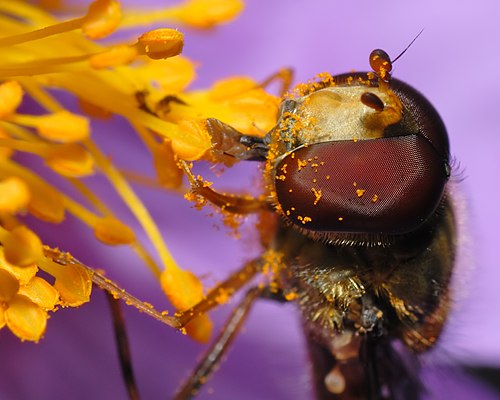Nectarnoun
The drink of the gods.
Nectarnoun
(by extension) Any delicious drink, now especially a type of sweetened fruit juice.
Nectarnoun
(botany) The sweet liquid secreted by flowers to attract pollinating insects and birds.
Nectarverb
(intransitive) To feed on nectar.
Nectarnoun
The drink of the gods (as ambrosia was their food); hence, any delicious or inspiring beverage.
Nectarnoun
A sweetish secretion of blossoms from which bees make honey.
Nectarnoun
a sweet liquid secretion that is attractive to pollinators
Nectarnoun
fruit juice especially when undiluted
Nectarnoun
(classical mythology) the food and drink of the gods; mortals who ate it became immortal
Nectar
Nectar is a sugar-rich liquid produced by plants in glands called nectaries or nectarines, either within the flowers with which it attracts pollinating animals, or by extrafloral nectaries, which provide a nutrient source to animal mutualists, which in turn provide herbivore protection. Common nectar-consuming pollinators include mosquitoes, hoverflies, wasps, bees, butterflies and moths, hummingbirds, honeyeaters and bats.
Pollennoun
A fine granular substance produced in flowers. Technically a collective term for pollen grains (microspores) produced in the anthers of flowering plants. (This specific usage dating from mid 18th century.)
Pollennoun
(obsolete) Fine powder in general, fine flour. (16th-century usage documented by the OED.)
Pollenverb
To cover with, or as if with, pollen.
Pollennoun
Fine bran or flour.
Pollennoun
The fecundating dustlike cells of the anthers of flowers. See Flower, and Illust. of Filament.
Pollennoun
the fine spores that contain male gametes and that are borne by an anther in a flowering plant
Pollen
Pollen is a powdery substance consisting of pollen grains which are male microgametophytes of seed plants, which produce male gametes (sperm cells). Pollen grains have a hard coat made of sporopollenin that protects the gametophytes during the process of their movement from the stamens to the pistil of flowering plants, or from the male cone to the female cone of coniferous plants.

























